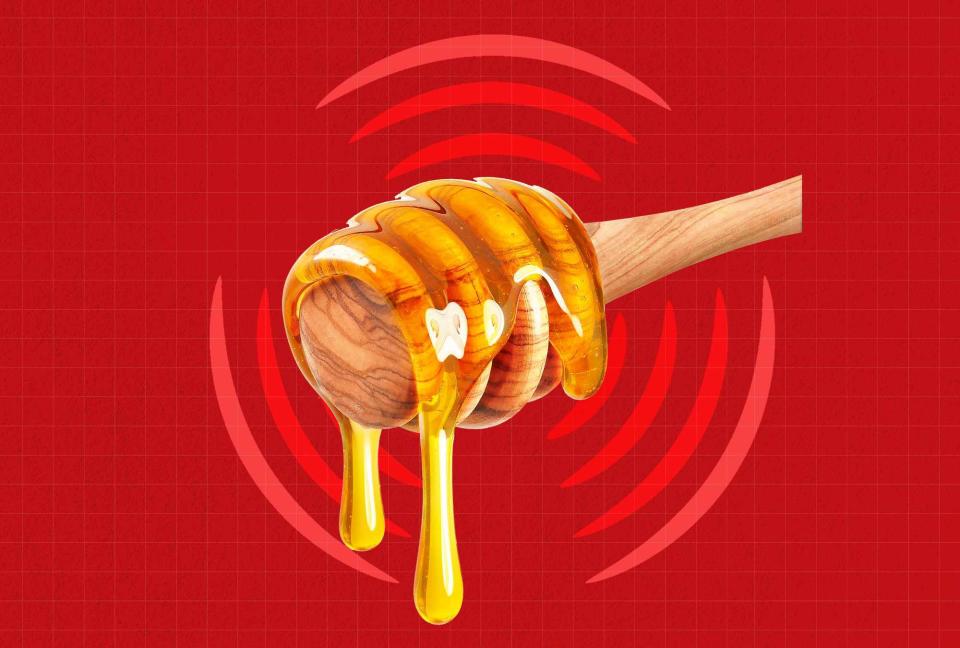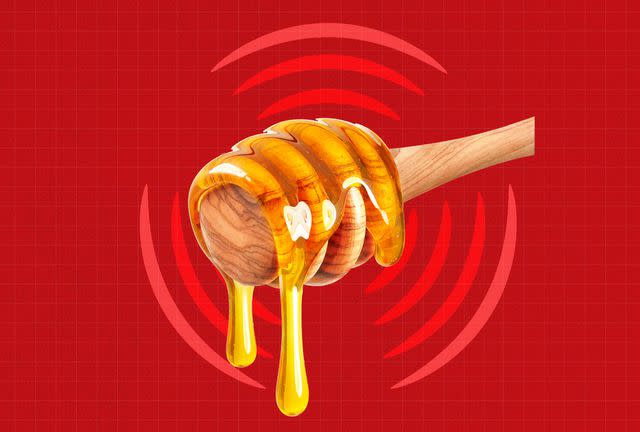I'm Allergic to Bees—Can I Eat Honey?
We asked a board-certified allergy and immunology specialist whether a person with a bee allergy should stop eating honey, and the answer is quite simple.

If you've spent any time watching Bridgerton on Netflix, you likely have learned by now that one of the beloved characters (spoilers!) dies because of a severe bee sting allergy. The scene is quite tragic and could be devastating to watch for someone who also experiences the same kind of reaction.
And yet, as you cook up chicken thighs with a honey-harissa glaze to enjoy while you watch the show, you may be wondering … should you also be worried about honey? If you're allergic to bees, does that mean that you're also allergic to the honey you drizzle onto your morning oatmeal or stir into your morning tea? If a bee sting can cause an allergic reaction for some, then it would almost make sense for honey produced by the same insect to cause the same kind of reaction. Right?
Fortunately, it's not as dire as you think. To get the specifics of why some people are allergic to bees and whether the two are correlated, we spoke with Andrea Burke, M.D., a board-certified allergist and immunologist based in New York City.

Why Are People Allergic to Bees?
When a bee—or any stinging insect—stings you, the barb containing the venom attaches to your muscle, injecting a little bit of its venom into your system. The venom includes certain proteins that can potentially cause allergic reactions. This is known as venom hypersensitivity.
According to Burke, there are three different families of stinging insects that most commonly cause an anaphylactic allergy. Honeybees are part of the Apidae family. They contain five major allergens in their venom. The allergen phospholipase A2 is known for sparking major inflammatory responses, followed by other minor allergens called hyaluronidase, acid phosphatase, CUS serine protease and icarapin. Burke says that honeybee stings happen most commonly on the feet when people are walking on grass or clovers, where honeybees tend to congregate outside of their hive.
There's a broad spectrum of possible reactions to a bee sting. "A non-allergic person can get stung and experience a localized inflammatory response as a result of a sting and venom that's injected," Burke explains. Even without a bee allergy, it's likely a person will have a localized reaction from the sting, such as a red circle around the area they were stung, as well as some swelling.
However, if you have an actual bee allergy, you could experience anaphylaxis, which will affect the whole body. "The allergy cells (called mast cells) throughout the body are activated, and it can trigger a cascade leading to a full-body reaction," she says. "Different parts of the body are triggered to react, like constriction in the lungs, vomiting, hives and swelling."
While Burke makes it known that the science isn't exactly clear where a bee allergy comes from, researchers speculate that it could be related to genetics. According to the World Allergy Organization, at least 40 people die in the U.S. each year due to venom anaphylaxis.
How to Find Out If You Have a Bee Allergy
Venom sensitivity is not part of routine allergy tests, so even if you are getting a standard allergy test done by an allergist/immunologist, a bee allergy will require specialized testing on a separate occasion—and there are two main ways to do so.
The first is skin testing. Allergists will take some of the harvested venom from different insects that cause the allergy and place it on your skin, then prick the skin with a sterile probe to see if a little red hive will surface. If it's negative or inconclusive, the allergist will inject more underneath the skin to again look for a red hive.
Second, a patient can test for the antibody through a blood test. If you have an allergy antibody that recognizes venom at a high enough level, a doctor could diagnose the allergy.
So If I'm Allergic to Bee Stings, Do I Need to Avoid Honey?
First, let's talk about how honey is made. To make honey, honeybees collect nectar from plants, which they then deposit into their honeycombs and transform into honey. Honeybees use the honey for food, but they don't typically consume as much as they produce. (According to the National Honey Board, on average, a hive produces 55 pounds of surplus honey a year, which can be harvested by a beekeeper.)
Related: Is Honey Healthier Than Sugar?
Thankfully, if you have a bee sting allergy you are not necessarily allergic to honey. Why? Because these two impacts from the bee are coming from two different parts of the insect's body.
Bee sting allergies come from the venom, which is part of the stinger. However, honey is transferred from the nectar that comes from the honeybee's tongue, called a proboscis. The venom sack is not at all connected, meaning the honey is completely free of the proteins that cause the allergy. Burke says she does not worry about her patients with bee allergies enjoying honey, and that it can be consumed regularly.
Can You Be Allergic to Honey?
While a bee allergy is not correlated with honey, a separate honey allergy is possible—although it is quite rare and unrelated to the venom itself.
"I've probably had less than a handful of patients in my career so far where a person has a reaction to honey," says Burke. "What's believed to be the reaction there is coming from the local pollen naturally accumulating in the area. What's in the air at the time could potentially contaminate the honey."
If you have a pollen allergy, Burke says you may experience some itching when you eat honey. But there's typically very little pollen in honey, so the chances of a person with a pollen allergy experiencing anaphylaxis from eating honey is very low. If this was to happen, Burke says it would mean the person was highly allergic to pollen and the honey would have to have a significant amount of pollen in it. So the average person doesn't need to worry about it, given how rare and unique it is.
Bottom Line
A bee allergy is the result of venom sensitivity, which is a reaction to proteins within the venom of a stinging insect, including a honeybee. Because the venom is not connected to a honeybee's tongue—which is where nectar is collected and transferred to the honeycomb for honey production—this means that someone with a bee sting allergy will not necessarily be allergic to honey. An allergy to honey is likely caused by pollen that can accumulate in the honey, but anaphylaxis (a whole-body inflammatory reaction) from honey is highly rare. Nevertheless, if you are experiencing anaphylaxis from anything, Burke says to go to the hospital immediately to seek treatment.

